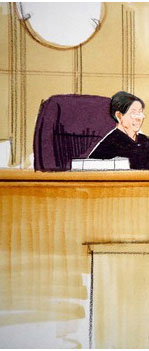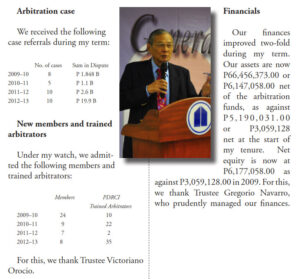However, there remain several projects that will have to be pursued by the incoming leadership of PDRCI. These are:
- Build-up of the best ADR library in the Philippines
- Videotapes of PDRCI training modules
- Training and recruitment of retired Justices of the Philippine Supreme Court and other appellate courts into the PDRCI roster of arbitrators
- Arbitrator kit
- Marker plate of our new office
It is my hope that the incoming leadership will not only pursue and complete these unfinished projects but will keep on looking for, and will adopt, innovative and progressive programs to improve PDRCI.
Last December 2012, I announced my plan to step down; I wanted to preempt any attempt to kick me out as President. I wanted our members to have sufficient time to reflect about my possible successor, who will lead PDRCI in the coming years. Just like past Presidents Dean Custodio Parlade and Eduardo Ceniza before me, I will continue to be active in PDRCI in some capacity.
Conclusion
I would like to believe that I am leaving a better and more stable PDRCI— with better facilities, healthier finances, more vibrant members, more experienced arbitrators, a more efficient and responsive staff, and with better rules and procedures.
But if there is a legacy or tradition I would like to leave PDRCI, that would be the exchange of gifts during our annual yearend meeting and get-together. What is meaningful are not the gifts but the roll call and sharing, where we call and acknowledge each and every member to come forward, to be recognized, and to speak and share about what he or she is thankful for the year about to end, and his or her hope or prayer for the year about to start. We believe that every one of our members is important and that we care enough to listen to and learn about each other’s significant past and hope for the future.
All in all, it was my distinct honor and privilege to have served PDRCI as President for four years. Whatever good or success was achieved during my watch, this I credit and owe to the support and encouragement of a lot of people, starting with our members, our arbitrators, our Trustees, and our support staff, particularly Bamba Parungao and Kim de la Cruz. Most especially, I must acknowledge and thank the Almighty who was and is always there for me.
All the shortcomings, inadequacies, failures and mistakes are completely and solely mine. Rest assured, however, that these are blunders of the mind; the heart is okay.
This is custom heading element
 The principle of party autonomy, .according to some authors, lies at the heart of commercial arbitration [Lew, Mistelis & Kroll, Comparative International Commercial Arbitration 400 (Kluwer Law Int’l, 2003)]. While I have no quarrel with this view, my experience does not comport with it.
The principle of party autonomy, .according to some authors, lies at the heart of commercial arbitration [Lew, Mistelis & Kroll, Comparative International Commercial Arbitration 400 (Kluwer Law Int’l, 2003)]. While I have no quarrel with this view, my experience does not comport with it.
The heart is the central or vital part of something. In people, it is regarded as the center of one’s thoughts and emotions, of courage, love and compassion. Party autonomy does not make arbitration lively or exciting; on the contrary, it makes arbitration dry and predictable. Hearings, however, make commercial arbitration—often dull and boring affairs—seem like a court trial. In that sense, the heart of arbitration is a full and impartial hearing.
Oral and written hearings
A hearing is essentially an opportunity for a party to present its case. Its purpose is to decide issues of fact or law, sometimes with witnesses testifying [Black’s Law Dictionary 788 (9 Ed.)]. It may include meetings of the arbitrators and the parties, without the testimony of witnesses [Yves Derains & Eric Schwartz, A Guide to the ICC Rules of Arbitration 221 (Kluwer Law Int’l, 2005)].
Hearings may be oral, in which case the parties will be given an opportunity to orally present their evidence or arguments, or it may be written, when the parties submit their evidence and arguments in writing. The International Bar Association (“IBA”) Rules on Taking of Evidence in International Commercial Arbitration (“IBA Rules”) uses the term “evidentiary hearing,” which means any hearing, whether or not held on consecutive days, at which the Tribunal receives oral evidence (IBA Rules 1 para. five).
In one arbitration, I replaced the chairman of the tribunal who recused himself after a challenge by one of the parties. When I accepted my appointment, the oral hearings had closed and the parties had submitted their post-hearing memorials.
The evidence was sparse: two principal witness statements and two reply statements, supported by copies of the main contract, the contract proposal, activity logs, and correspondence between the parties. The transcript of the oral hearings consisted of a statement of respondent’s counsel that he had no questions for the claimant’s witness and that one of respondent’s key witnesses was already assigned in anther country and was no longer available for examination. His remaining witness admitted on crossexamination that he became involved in the project after it was completed.
By then the arbitration was already delayed by several months, and it was clear that the parties were not in the mood for a rehearing. Before the tribunal was truncated by the chairman’s withdrawal, the parties had agreed to submit their dispute for decision on the basis of the record. The new tribunal had two months to issue its award. However, apart from the fact that I was new to the case, one of the arbitrators was slated to be away for a month and a half. That gave the tribunal just two weeks to convene and render its award based on the record.
The tribunal drafted the award and issued it on time, but it was a cold, academic exercise. Not having attended the oral hearing, I could only imagine the parties and their claims. As I read the written submissions and reviewed the documents submitted in evidence, several questions came to mind but there were no parties or witnesses to clarify them with. The dispute was very real to the parties and their counsel, yet to the tribunal it was a distant affair that lacked the drama of a real-life legal struggle.
Putting a human face to hearings
Unlike written hearings that can be cut-and-dried exercises, oral hearings give the parties and their counsel an opportunity to interact with the tribunal. Depending on the evidence, oral hearings may help clarify a party’s cause or defense, or reveal its weakness. A counsel’s skill and experience also play a role during the oral hearings.
Oral hearings can expose witnesses who exaggerate, make false claims, or assert a fact that they know nothing about. In most cases, however, witnesses are truthful and offer details that their counsel sometimes miss. In extreme cases, witnesses can be invested in the positions of the parties and become argumentative. In one hearing, the witness tried to antici- pate the purpose of the counsel’s examination and actually told him, “I know why you are asking that question.” This tends to show the witness’ bias and weakens his or her testimony.
According to one practitioner, What we cannot do in writing is let the arbitrators assess the credibility and demeanor of witnesses. We can help the witnesses present their testimony in their written statements—we can put the facts on paper. But we cannot put the witness’s candor on paper. I am very much a believer in the advice we received yesterday, that your written submissions are your first chance to make a first impression, and that both your submission and your witness’s statements must tell a clear, straightforward story. But the witness’s testimony is the opportunity to put a human face to that story. … If we did not examine the witness, we would have only words on paper, and untested words at that. … I think we can agree that, as a matter of human nature, it can be a lot harder to stand by the accuracy or truth of a statement in person than it is to read and sign a piece of paper [Marinn Carlson, “The Examination and Cross-Examination of Witnesses,” in Albert Jan Van den Berg, Gen. Ed., Arbitration Advocacy in Changing Times: ICCA Congress Series No. 15 203 (Wolster Kluwer, 2011)].
Arbitrators are often selected for their experience, expertise and reputation, but they are also humans who are susceptible to persuasion. As a rule, arbitrators tend to accept testimonies of witnesses who are candid and who know the facts at heart. Consistency and spontaneity are often indicators of truthfulness. Witnesses who are elusive, argumentative, and who exaggerate or are untruthful are usually considered as biased, although the tribunal will usually not reject a testimony on the ground that it is incredible. Without the benefit of oral hearing, however, the tribunal will not be able to see the witnesses’ demeanor while testifying.
Preparing for the hearing
The best way to handle the oral hearing is to use it as a road map to guide the tribunal in resolving the factual and legal issues submitted to it. For example, while generally a fact witness will not be allowed to give his opinion on a contractual stipulation, he may be asked to narrate facts that show how the parties applied the stipulation in practice. In a dispute involving a contractual breach, witnesses may be asked to testify on specific acts or omissions of the parties to prove their claim or defense. A document may be identified and related to a contractual stipulation.
Because most arbitration are resolved on the basis of documents, the witness should make full use of the oral hearing to tell a story that the tribunal will easily follow. Since arbitrators are required to be impartial and independent, they tend to withhold judgment until after the oral hearings are closed and the issues are submitted for resolution. This can make oral hearings tedious to follow unless the witnesses lead the tribunal through their narratives. Much of this will depend on the preparation of the witnesses by the counsel and, ultimately, on the counsel’s skill in asking the right questions.
As so well stated in one paper,
…Parties, witnesses, experts, counsel and arbitrators must all prepare for the hearing, and the hearing is the only time in the arbitral process where all the participants are fully focused on the case at the same time. An imminent hearing concentrates minds wonderfully and this contemporaneous focus is a powerful force. At this time parties may suddenly settle matters that previously proved intractable, and counsel (may) dispense with witnesses and lines of argumentation that were previously deemed indispensable. Arbitrators must be fully familiar with all aspects of the case and identify the key questions around which their award will turn. The arbitral tribunal can harness the force of this preparation and concentration to review efficiently contested points and so shorten the overall procedure. Experts can be brought together to identify points of agreement and sharpen the focus on the real points of difference. Contemporaneous preparations can clarify the parties’ positions and reduce the issues in dispute, which in turn can reduce time and costs, and improve the quality at the time of drafting the award.
From the perspective of the arbitral tribunal, therefore, it is important to ensure, where possible, that counsel, the parties and their witnesses are well prepared for the hearing. … (David J. A. Cairns, “Oral Advocacy and Time Control in International Arbitration,” in Van den Berg, supra, at 184).

